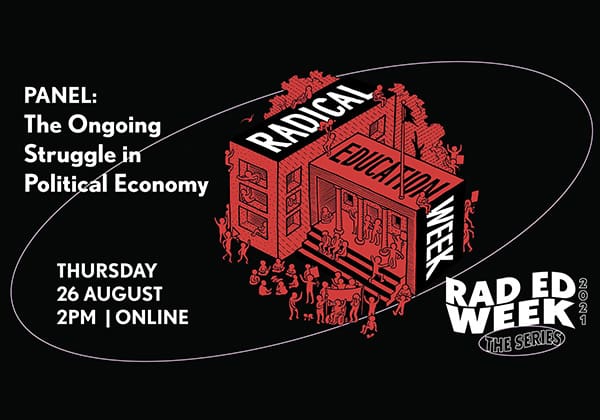There’s this sentiment in the popular conscience that students go to university where the liberal elite turn them into Marxists. I recently transferred from engineering to political economy because, well… this just hadn’t happened yet. As part of my formal radicalisation, I thought it appropriate to attend the SRC’s Radical Education Week workshop ‘The Ongoing Struggle for Political Economy.’ Much to my dismay, indoctrination by the liberal elite was not on the agenda.
The workshop took the form of a panel discussion with Q&A MC’d by SRC president Swapnik Sanagavarapu. The panel consisted of ECOPSoc VP Lia Perkins, department academic Joe Collins, and Emeritus professor Frank Stilwell. The session kicked off with a history lesson of the department, or “The Battle of Hastings,” as Stilwell described it. It then shifted into a discussion of the contemporary relevance of political economy versus mainstream economics. Finally, there was a lively discussion about the political impacts of the discipline, its activist orientation, and accessible communication. Perhaps intentionally, the department’s history was reflected in the panel, with students and academics (young and old) all represented.
The department of political economy emerged through decades of struggle by students and younger academics. Starting in the 1970s, students did not see the issues of war, environmentalism, and women’s rights discussed in the economics classroom despite their relevance to the discipline (think the military-industrial complex, resource depletion, and women’s workplace participation for example). What Stilwell made clear was that students wanted to learn about these things because they wanted to see them fixed through social, political, and economic means.
Students of all stripes can surely relate to many of the same grievances. Today we bear witness to the fallout of COVID-19, growing wealth inequality and the climate catastrophe. I enjoyed not just Stilwell’s enthusiasm and jokes, but the emphasis on action. Political economy has normativity at the centre of its project. We should be seeking to change things for the better beyond just understanding them. Perkins’ position as SRC Welfare Officer speaks to the meaningful overlap between academia and activism that many political economy students embrace. The pluralist thought advocated in the discipline enables great flexibility in analysing and acting on the issues we all care about.
The strength of the workshop was in its intuitive delivery. There was discussion of very observable phenomena like unequal power relations and how they do harm. Joe Collins spoke to the COVID-19 outbreaks in south-west Sydney where distribution centres, rather than office towers, are located. Being empowered to work from home means some are better protected. The south-west is a lower socioeconomic area and so its residents are less likely to enjoy such a privilege. Studies of power have been central to my study of political economy. However, I was a little disappointed to see slightly less discussion of the struggle for relevance within the broader economic discourse. My training as a Marxist super-soldier will be for nought if I don’t know where I’m going to be deployed, after all.
All jokes aside, this workshop was invaluable for those looking to make a start on their political economy journey and for those setting sail. While wrapping up, Collins told us of the final lecture slide he leaves all his students. On it is the name of a book wherein Australian bureaucrats attribute their navigation of economics to their university training. It is imperative that students study the social and economic causes they care about if they hope to be part of the change. Political economy is a great pathway to pursue, and this workshop made that clear. Unfortunately, if you take this journey you’ll be even more critical of Marx than when you started — so much for the indoctrination!





